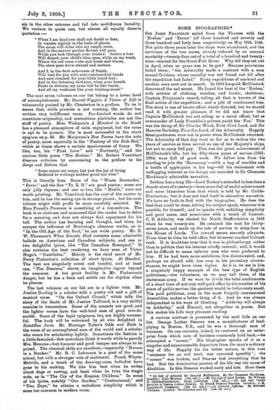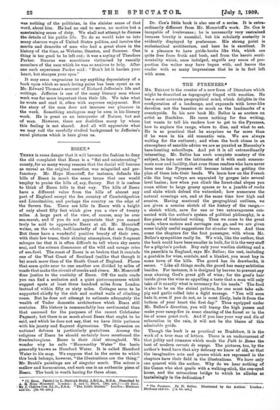SOME BIOGRAPHIES.*
SIR JOHN FRANKLIN sailed from the Thames with the 'Erebus' and ' Terror ' (of three hundred and seventy and three hundred and forty tons respectively) on May 19th. 1845. Not quite three years later the ships were abandoned, and the survivors of the two crews, already reduced by an unusual mortality—twenty-four out of a total of a hundred and twenty- nine—started for the Great Fish River. Why did they set out in April, when no game was to be got ? Because provisions failed them ; "the Admiralty made a contract with a man named Goldner, whose rascality was not found out till after the expedition had failed." Forty expeditions of one kind and another were sent out in search. In 1859 Leopold McClintock discovered the sad secret. He found the boat of the 'Erebus,' with articles of clothing, watches, and books; skeletons; Captain Fitzjainee's record, telling all that is known of the final action of the expedition ; and a pile of condemned tins. The story is one of heroic effort wisely directed, but we should read it with greater pleasure if we did not know that Captain McClintock was not acting as a naval officer, but as commander of Lady Franklin's private yacht the Fox.' This was the doing of ,Sir Charles Wood, First Civil Lord, and Sir Maurice Berkeley, First Sea Lord, of the Admiralty. Happily these gentlemen were not in power when McClintock returned. The Admiralty of that day went so far as to reckon the two years of service as time served on one of her Majesty's ships, but not to carry full pay. This was the great achievement of McClintock's life; but his fifty-three years of service (1831- 1884) were full of good work. We follow him from his starting to join the Sa.maraug '—with a bag of marbles and a bottle of apple-juice in his bag—till his retirement with unflagging interest as his doings are recorded in Sir Clements Markham's admirable narrative.
Seldom has a long life—Lord Norton's extended to less than a decade short of a century—been more full of useful achievement and more blameless than that which is told by Mr. Childe- Pemberton ; but it does not lend itself to attractive narrative. We have no fault to find with the biographer. He does the best that could be done, letting his subject speak, wherever it is possible, for himself ; and he speaks with unfailing simplicity and good sense, and sometimes with a touch of humour. C. B. Adderley was elected for North Staffordshire in 1841 when he was twenty-six. He retained the seat for thirty- seven years, and made up the tale of service to sixty-four in the House of Lords. The reward seems scarcely adequate. From time to time he held office, but he never reached Cabinet rank. Ibis doubtless true that it was in philanthropy rather than in politics that his interest chiefly centred ; still, it would not be difficult to name inferior men who were preferred to him. If he had been more ambitious, less disinterested, and, perhaps we should add, less easy in his pecuniary circum- stances, he might have risen higher. As it is, we see in him a singularly happy example of the best type of English politicians,—the volunteers, as we may call them, of the statesman army. If we were to divide the total emoluments of a short time of not very well-paid office by the number of his years of public service, the quotient would be ludicrously small. The paid politician, even in the most frugally remunerated Assemblies, makes a better thing of it. And he was always independent in his ways of thinking. "Adderley will always be Adderley," said Disraeli, not altogether in praise. But this makes his Life very pleasant reading.
A curious contrast is presented by the next Life on our list. George Luther Stearns was a manufacturer of lead- piping in Boston, U.S., and he was a thorough man of business. On one occasion, indeed, he ventured on an enter- prise from which men of business commonly hold back,—he attempted a "corner." His biographer speaks of it as a singular and unaccountable departure from the man's ordinary way of life. Happily for his better nature, in this case "sentence for an evil work was executed speedily "; the "corner" was broken, and Stearns lost everything that he had. But the dominating passion of his life was the cause of Abolition. In this Stearns worked early and late. Here there • (1) Life of Admiral Sir Leopold McClintock. By Sir Clements Markham. London : John Murray. [15s. net.]—(t) The Life of Lord Norton. By William S. Childe*Pemberton. Same publisher. [12s. net.]—(3) Lifs and Public Services of Georg. Luther Stearns. By Frank Preston Steams. London : J. B. . Lippincott Company. [10s. 6d. net.]—(4) Richard .1sferia. By Rdwu4 Thomas. London : Elutchinsou and Co. [10s. 6d. net.] was nothing of the politician, in the sinister sense of that word, about him. He had no end to serve, no motive but a constraining sense of duty. We shall not attempt to discuss the details of his public life. To do so would take us into many obscure ways of United States politics, and involve the merits and demerits of men who had a great share in the history of the time, as Webster, Stanton, and Sumner. One thing is too good to be left out; it was a saying of Theodore Parker. Stearns was sometimes victimised by rascally members of the race which be was so anxious to help. After one such experience Parker said; "Don't let it harden your heart, but sharpen your eyes."
It may seem ungracious to say anything depreciatory of a book upon which so much loving pains has been spent as on Mr. Edward Thomas's account of Richard Jefferies's life and writings. Jefferies is one of the many literary men whose work was far more important than their life. We take what he wrote and read it, often with supreme enjoyment. But the story of the man does not increase our pleasure in the work. Something analogous may be seen in his literary work. He is great as an interpreter of Nature, but not of man. However, there are doubtless many by whom this feeling is not shared. And all will appreciate what we may call the carefully studied background to Jefferies's rural pictures which is here given us.















































 Previous page
Previous page